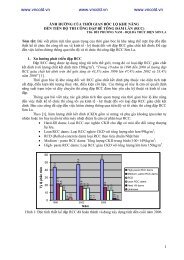Civil Engineering Project Management (4th Edition)
Create successful ePaper yourself
Turn your PDF publications into a flip-book with our unique Google optimized e-Paper software.
174 <strong>Civil</strong> <strong>Engineering</strong> <strong>Project</strong> <strong>Management</strong><br />
Contractors sometimes use the critical path method to support a claim for<br />
delay; but the same problem applies that any critical path is based on only one<br />
particular order in which work is constructed, and other orders may be possible.<br />
14.6 The part played by the agent in achieving<br />
progress<br />
It is the contractor’s agent who has on-the-spot responsibility for programming<br />
the work and keeping progress in line. The resident engineer’s job is to assist<br />
the agent, if asked, and provide any information that the agent needs or that<br />
will be helpful to him. As the work proceeds the resident engineer will keep<br />
a check on progress, and must advise the engineer when unacceptably slow<br />
progress is occurring. Before acting formally in this matter the resident engineer<br />
should put his comments to the agent, seeking to find out why work is going<br />
slow and endeavouring to persuade him to take steps to speed up construction.<br />
He must also identify causes of delay for which the employer is responsible.<br />
A contractor’s slow progress can be caused by many factors – lack of labour,<br />
lack of skilled key men, a weak general foreman, or an agent not sufficiently<br />
decisive or good at organization, or tending to under-estimate the difficulty of<br />
a job and failing to foresee problems arising. Sometimes the cause may lie with<br />
the contractor’s head office, such as slowness in getting materials or equipment<br />
to site. This may be indicative of the contractor being outstretched, either<br />
organizationally or financially. It is important that the resident engineer gets<br />
sufficient information to give the engineer reliable advice as to where the cause<br />
of slow progress lies because, if the lack of progress continues, the engineer<br />
will have to take up the matter formally with the contractor.<br />
A good agent is an inestimable benefit to a project. He automatically thinks<br />
in terms of the ‘critical path’ that lies ahead, and has clearly in his mind where<br />
the job ‘ought to be’ in a month’s or 2 months’ time. But to get there he has<br />
to make many decisions in the present. He has to seize opportunities, overcome<br />
delays, take extra work into account, suffer inefficiencies of labour and<br />
breakdowns of plant, find solutions to unexpected problems, face the vagaries<br />
of the weather and, despite all these, keep the work going at the required pace<br />
to gain his targets. The immediate targets are short term – this week’s in detail,<br />
next week’s in outline. If he can achieve them, he knows they are within the<br />
longer term strategy he has already worked out.<br />
He has also to be aware of the need to have safety margins of time in hand for<br />
overcoming all sorts of difficulties that his experience tells him will inevitably<br />
crop up, even though he cannot forecast the precise form they will take. Many<br />
factors influence his judgement. He will be quick to detect when things are in<br />
his favour – when weather seems to promise fine, when the spirit on the job<br />
is good and the men are working efficiently as a team – and, grasping such<br />
opportunities, he will use them to drive the job onwards, knowing that one


















